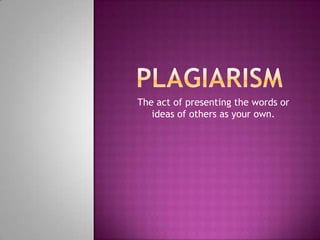
Common Types of Plagiarism
- 1. The act of presenting the words or ideas of others as your own.
- 2. Let’s assume that two students are writing research papers for a history course. On a visit to the library they both come across the following excerpt from a compilation, Napoleon: The Final Verdict, copyrighted in 1996 by Arms & Armour Press. The passage refers to the closing stages of the Battle of Waterloo and was written by Andrew Uffindell. Learning in the Academy: An Introduction to the Culture of Scholarship, Creighton University, College of Arts & Sciences, 2nd printing, 2005
- 3. At this stage many a general would have broken off the battle and retreated. But Napoleon could not afford a single setback for it would destroy his reputation and embolden the political opposition in Paris. He had no choice but to stake everything on an attack by his Guard against Wellington. To boost his army’s flagging morale, Napoleon sent messengers around the battlefield falsely to announce that Marshal Grouchy was arriving. This ruse was risky for if Napoleon’s troops discovered the truth, the sudden disillusionment would shatter the army. But Napoleon was a gambler, and the cheers of “Vive l’Empereur! Soldats, voila Grouchy!” certainly galvanized his army into a renewed effort in support of the Guard attack.
- 4. Example A- Unacceptable All seemed lost for Napoleon, and many a general would have broken off the battle and retreated. Yet, he could not afford to do so as a single setback would destroy his reputation and harden the political opposition in Paris. Why is this unacceptable? The words in red are taken directly from the source. Nothing gives credit to the author.
- 5. Example B- Acceptable According to Uffindell, all seemed lost for Napoleon, but to pull out would "destroy his reputation and embolden the political opposition in Paris” (186). Why is this acceptable? The author’s words are in quotations Statement is bookended Begins with author’s name Ends with citation (page number from book)
- 6. Example A- Unacceptable Napoleon had a choice to make. He could either retreat and face almost certain political collapse back in Paris or stake everything by confronting the British troops with his Imperial Guard. Never one to break off an engagement willingly, Napoleon chose the latter option. Then, to boost his troops’ morale, the Emperor dispatched messengers around the camp with the false announcement that Marshal Grouchy would soon arrive to relieve them. Why is this unacceptable? “In Example A, the writer picks numerous words and phrases from Uffindell’s paragraph, sometimes changing their form slightly (for example, substituting false announcement for falsely to announce). But he does nothing to disguise his wholesale adoption of Uffindell’s analysis of the situation. The resulting text is plagiarized because the author could fairly claim very little as his own work beyond some superficial editing.”– Learning in the Academy: An Introduction to the Culture of Scholarship, Creighton University, College of Arts & Sciences, 2nd printing, 2005
- 7. Example B- Acceptable According to Andrew Uffindell, Napoleon had a challenging decision to make at this point: either fall back and face almost certain rejection at home or “stake everything on an attack by his Guard against Wellington.” Never one to accept defeat, Napoleon chose the latter and, “[to] boost his army’s flagging morale, ... sent messengers around the battlefield falsely to announce that Marshal Grouchy was arriving” (Uffindell 186). Why is this acceptable? Everything borrowed is in quotation marks The paragraph is bookended The quotes are truly part of the sentence Her own words are used in between
- 8. Example A- Unacceptable Out of fear that his debilitated army would be unable or willing to make a final charge, Napoleon started the rumor that Marshal Grouchy was nearby and would be arriving to assist them at any moment. This could have been a dangerous move for the Corsican; if his soldiers had found out it was no more than a rumor, they would most definitely have lost heart and with it the desire to fight. But Napoleon was always one to take chances. His ruse worked, and a newly invigorated army prepared to attack the British line. Why is this unacceptable? Even though the writer used his own words, he did not give credit to the author for using her information.
- 9. Example B- Acceptable According to historian Andrew Uffindell, out of fear that his debilitated army would be unable or willing to make a final charge, Napoleon started the rumor the Marshal Grouchy was nearby and would be arriving to assist them at any moment. This could have been a dangerous move for the Corsican; if his soldiers had found out it was no more than a rumor they would most definitely have lost heart and with it the desire to fight. But Napoleon was always one to take chances. His ruse worked and a newly invigorated army prepared to attack the British line (Uffindell 186). Why is this acceptable? (Notice the phrasing is the same) The writer cited the author. Bookending it makes it acceptable!
- 10. Learningin the Academy: AN Introduction to the Culture of Scholarship, Creighton University, College of Arts & Sciences http://puffin.creighton.edu/ccas/forms/Learnin ginAcademy.pdf Avoiding Plagiarism: Mastering the Art of Scholarship, a UTSA Publication of Student Judicial Affairs. SFU Library- Subject Research website http://www.lib.sfu.ca/researchhelp/subjectguid es/engl/classes/EssayArch.htm
- 11. Cite it.
